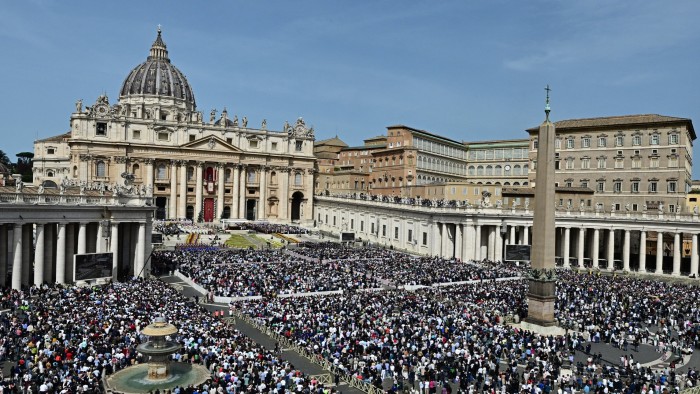Stay informed with free updates
Simply sign up to the Artificial intelligence myFT Digest — delivered directly to your inbox.
The writer is a Franciscan monk, ethics professor at the Pontifical Gregorian University and technology adviser to the Vatican
Last summer, leaders representing 11 global religions, from eastern faiths including Buddhism, Hinduism, Zoroastrianism and Bahá’í to Abrahamic religions like Christianity, Judaism and Islam, gathered in Hiroshima, Japan, and signed the Rome Call for AI Ethics.
Why did the representatives of these schools of thought, which are sometimes so far apart, sign this appeal for a humane approach to technology development? Because they share concerns about the ways in which humanity will be affected by artificial intelligence.
I was present at the signing and witnessed an atmosphere of collaboration. Those present wanted to contribute to a future in which no technological innovation could ever be used for mass destruction.
The moment of change we face is so profound that we might compare its opportunities and crises to the Renaissance — a time of disorder and transformation that destabilised the established order of the medieval world. European societies shifted from a worldview centred on Europe and the Catholic Church to a global perspective, with new lands, peoples and resources. Europe’s religious unity fragmented and a new economic order weakened traditional structures.
In the intervening centuries, the Church has changed its view of technology: it is now seen as an agent of social transformation whose effects must be managed. Technological innovation is perceived as a factor of social justice and not as a dogmatic issue. The Church does not regard AI as a danger (as was the case with Galileo’s telescope) but it is prompting faiths to ask themselves once again what it means to be human and what man’s place is in this new cosmos made up of living beings and intelligent machines.
It is therefore our responsibility to question what AI’s correct use should be. We are witnessing the birth of a new set of creeds that are shifting the frontier of the existential horizon. In Silicon Valley, Peter Thiel’s interpretations of the late Stanford professor René Girard suggest conflict is inevitable. Elon Musk promotes so-called post-humanism, in which humans merge with technology. Computer scientist Timnit Gebru has proposed Tescreal — a neologism for philosophies that imagine a future of enhanced humans and suggests harmful projects are justified by the threat of human extinction.
In the words of the late Pope Francis: “We are not living an era of change but a change of era.”
Francis’s successor has continued to emphasise the importance of AI. In one of his first speeches, he explained the meaning behind his decision to take the name Leo XIV. This was in reference to Leo XIII, who presided over the Church in the aftermath of the industrial revolution and spoke up against inequality and in support of workers. Pope Leo has pointed to the frontier of a new industrial revolution. Today, it is AI, and not assembly lines, that is driving contemporary social change.
This year, the Vatican has hosted executives from Google, Meta, Anthropic and Palantir at a conference on AI, ethics and corporate governance.
The Church hopes to use its social doctrine to protect human dignity and work. This is not a political ideology, but rather a theological and moral reflection that arises from the Christian faith — a set of principles, teachings and guidelines developed in relation to the social, economic, political and cultural problems of the contemporary world. It is not only for Catholics but shared with the rest of society.
In our modern time of collective disorientation, the Catholic Church and other religions regard themselves as the companions of those who are searching for meaning.



